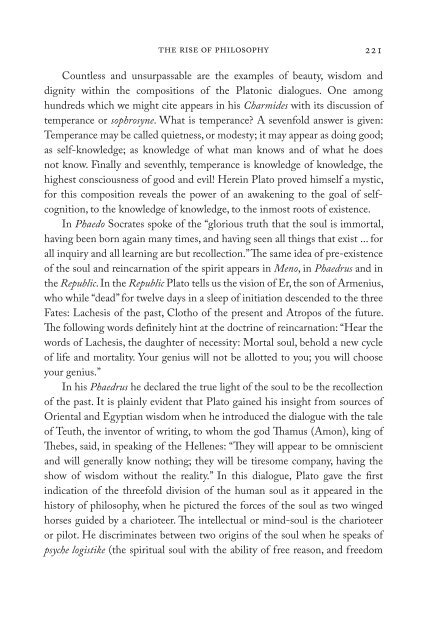The Gospel of Hellas - Research Institute for Waldorf Education
The Gospel of Hellas - Research Institute for Waldorf Education
The Gospel of Hellas - Research Institute for Waldorf Education
Create successful ePaper yourself
Turn your PDF publications into a flip-book with our unique Google optimized e-Paper software.
the rise <strong>of</strong> philosophy<br />
Countless and unsurpassable are the examples <strong>of</strong> beauty, wisdom and<br />
dignity within the compositions <strong>of</strong> the Platonic dialogues. One among<br />
hundreds which we might cite appears in his Charmides with its discussion <strong>of</strong><br />
temperance or sophrosyne. What is temperance? A sevenfold answer is given:<br />
Temperance may be called quietness, or modesty; it may appear as doing good;<br />
as self-knowledge; as knowledge <strong>of</strong> what man knows and <strong>of</strong> what he does<br />
not know. Finally and seventhly, temperance is knowledge <strong>of</strong> knowledge, the<br />
highest consciousness <strong>of</strong> good and evil! Herein Plato proved himself a mystic,<br />
<strong>for</strong> this composition reveals the power <strong>of</strong> an awakening to the goal <strong>of</strong> selfcognition,<br />
to the knowledge <strong>of</strong> knowledge, to the inmost roots <strong>of</strong> existence.<br />
In Phaedo Socrates spoke <strong>of</strong> the “glorious truth that the soul is immortal,<br />
having been born again many times, and having seen all things that exist ... <strong>for</strong><br />
all inquiry and all learning are but recollection.” <strong>The</strong> same idea <strong>of</strong> pre-existence<br />
<strong>of</strong> the soul and reincarnation <strong>of</strong> the spirit appears in Meno, in Phaedrus and in<br />
the Republic. In the Republic Plato tells us the vision <strong>of</strong> Er, the son <strong>of</strong> Armenius,<br />
who while “dead” <strong>for</strong> twelve days in a sleep <strong>of</strong> initiation descended to the three<br />
Fates: Lachesis <strong>of</strong> the past, Clotho <strong>of</strong> the present and Atropos <strong>of</strong> the future.<br />
<strong>The</strong> following words definitely hint at the doctrine <strong>of</strong> reincarnation: “Hear the<br />
words <strong>of</strong> Lachesis, the daughter <strong>of</strong> necessity: Mortal soul, behold a new cycle<br />
<strong>of</strong> life and mortality. Your genius will not be allotted to you; you will choose<br />
your genius.”<br />
In his Phaedrus he declared the true light <strong>of</strong> the soul to be the recollection<br />
<strong>of</strong> the past. It is plainly evident that Plato gained his insight from sources <strong>of</strong><br />
Oriental and Egyptian wisdom when he introduced the dialogue with the tale<br />
<strong>of</strong> Teuth, the inventor <strong>of</strong> writing, to whom the god Thamus (Amon), king <strong>of</strong><br />
<strong>The</strong>bes, said, in speaking <strong>of</strong> the Hellenes: “<strong>The</strong>y will appear to be omniscient<br />
and will generally know nothing; they will be tiresome company, having the<br />
show <strong>of</strong> wisdom without the reality.” In this dialogue, Plato gave the first<br />
indication <strong>of</strong> the threefold division <strong>of</strong> the human soul as it appeared in the<br />
history <strong>of</strong> philosophy, when he pictured the <strong>for</strong>ces <strong>of</strong> the soul as two winged<br />
horses guided by a charioteer. <strong>The</strong> intellectual or mind-soul is the charioteer<br />
or pilot. He discriminates between two origins <strong>of</strong> the soul when he speaks <strong>of</strong><br />
psyche logistike (the spiritual soul with the ability <strong>of</strong> free reason, and freedom

















